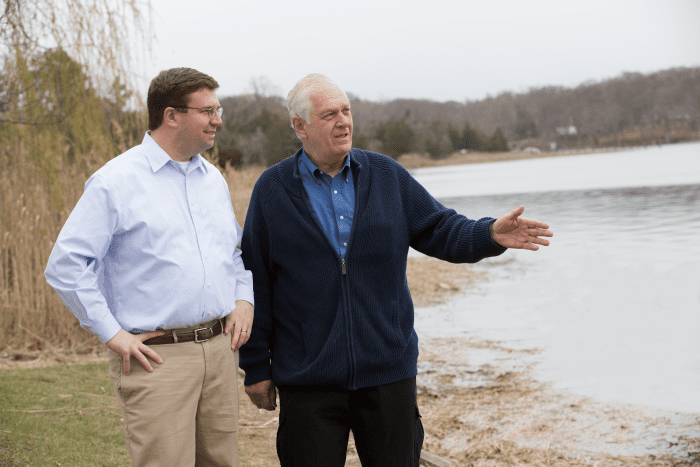Setauket resident has his eyes on top county seat

A former congressional primary candidate is aiming for Suffolk County’s executive seat.
 Last week, Setauket’s David Calone announced his intention to run for county executive on the Democratic ticket in 2023. Due to term limits, Steve Bellone (D) will not be running.
Last week, Setauket’s David Calone announced his intention to run for county executive on the Democratic ticket in 2023. Due to term limits, Steve Bellone (D) will not be running.
“I would bring a lot of different perspectives and a lot of backgrounds to the regional leadership of the county executive position,” Calone said in a phone interview.
Running for the office is something he has been thinking about for a few months. The candidate said he became more committed to his goal after conversations with many who provided strong moral support, such as John Durso, president of the Long Island Federation of Labor, state Assemblyman Steve Englebright (D-Setauket), county Legislator Kara Hahn (D-Setauket) and Town of Brookhaven Councilmember Jonathan Kornreich (D-Stony Brook).
Without any formal fundraisers, Calone has already raised nearly a million dollars for his campaign, he said.
Currently, Calone, a former federal and state prosecutor, is the only one who has thrown his hat in the ring, but candidates have until early next year to submit their petitions. If other candidates decide to run for county executive on the Democratic ticket, a primary would be held.
The candidate said he wanted to start campaigning early because Suffolk County is a vast area to cover.
“I’m looking forward to meeting with people across Suffolk County over this next year and hearing their ideas and issues, and then we can work to solve those challenges,” he said.
When he ran in the Democratic primary for Congress in 2016 in the 1st Congressional District, he lost to former Town of Southampton Supervisor Anna Throne-Holst by a slim margin of slightly more than 300 votes. He said from the experience he learned how to run an extensive campaign.
“I was able to learn about all the issues affecting people across Suffolk County,” he said. “Many issues are common across the whole area, but there were also some very specific local issues,” adding while some may worry about environmental issues, in contrast others are trying to make ends meet.
Background
Calone grew up in Mount Sinai and graduated from Port Jefferson high school. He went on to achieve his undergraduate degree from Princeton University and his law degree from Harvard. He and his wife, Presbyterian minister Kate Jones Calone, have three children and moved to Setauket 10 years ago when Jones Calone joined Setauket Presbyterian Church.
While a federal prosecutor, his focus was terrorism and international corporate fraud. As a state prosecutor, he fought health care fraud, and won a case that, at the time, was one of the biggest returns of taxpayer money — more than $70 million, according to him.
He is president and CEO of Jove Equity Partners LLC, which helps to start companies and works with owners to build their businesses.
“I’m looking forward to meeting with people across Suffolk County over this next year and hearing their ideas and issues, and then we can work to solve those challenges.”
— David Calone
County issues
Calone listed protecting the environment, improving transportation and economic development among his biggest concerns.
Working in the private sector and being involved in various businesses for more than 15 years, he said experience has provided him with a good deal of knowledge regarding economic development.
The candidate said he believes in supporting small businesses and providing workforce development to make sure “people get the skills they need for the next generation of jobs.”
“I think it is going to be critically important, too, because we live in a very high cost area,” he said. “We need to have people getting good paying jobs to be able to afford to live here.”
His company also created the Long Island Emerging Technologies Fund to help launch businesses coming out of local research labs, which in turn creates local jobs.
As board chair of Patriot Boot Camp, which was recently acquired by Disabled American Veterans, Calone has played a part in helping veterans, active military members and their spouses start their own businesses. He said while the U.S. Department of Veterans Affairs holds job fairs, they don’t focus on entrepreneurship, which many military members may be well suited for due to being disciplined and hardworking
He also feels there are different ways to bring town governments together to address similar problems.
When he was chair for eight years of the Suffolk County Planning Commission, the group worked on streamlining solar panel permits throughout the county as each town had a different set of rules, which caused headaches for solar panel companies. The towns came together and agreed on one form, which made the process more streamlined, and the committee received the National Association of Counties 2012 National Achievement Award for the effort.
Calone said he would also like to improve transportation in the county, pointing out that many of the buses are empty or nearly empty and therefore a waste of fuel. He said he would like to see the pilot program that county Legislator Bridget Fleming (D-Noyac) started in Southampton expanded to the whole county. When someone needs transportation, they use a cellphone app and smaller buses are used. He said requesting a bus would be similar to using Uber or Lyft and the service overall would be more efficient.
Regarding development in the county, he said developing near major roadways and travel hubs such as Ronkonkoma train station, as other elected officials have suggested in the past, makes sense. He also said it’s important to create more affordable housing.
“We need to have more housing that works for people at different times of their lives,” he said. “One of the key things is if young people move away, because they can’t find housing here, they’re more likely to stay away and not come back. But if we can keep them here because we have the kind of housing that they need, and the good-paying jobs that they need, they’re more likely to stay here and be the buyers of those single-family homes in the future.”






